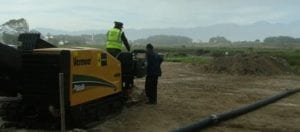A sensitive wetland project necessitated a solution with a minimal site footprint and little or no excavation – the perfect opportunity to utilise trenchless alternatives.
Current legislation limits the degradation of environmentally sensitive areas due to construction activities. With the introduction of no-dig construction techniques, project managers have the opportunity to explore alternative construction methods that have a minimal site footprint, require little or no excavation and ultimately address the environmental constraints faced by conventional construction processes. This was the case when the City of Cape Town commissioned the installation of a new, much-needed 400-mm diameter effluent main in the Strand area. A section of this pipeline traversed a catchment area for stormwater run-off, which, over time, had formed a wetland.TT Innovations was contracted to provide trenchless alternatives to the conventional dig and lay. Horizontal directional drilling, the no-dig option, was accepted by the client – largely persuaded by the projects’ environmental team. The 400-mm diameter pipeline section installed under the wetland area measured 160 m. A second pipeline was also installed under an existing waterway, with the pipeline measuring 24 m. The drilling project was completed within a week – despite heavy rains in the area. The combined resistance of the weight and friction of the HDPE pipeline measured well within the drill rig’s 16 t pull-back capability. This particular rig has the capacity to install bores of up to 450 m in length and has previously installed pipelines as large as 800 mm in diameter. In a similar project, this drill rig and crew installed a 200-m long pipe measuring 315 mm in diameter under a river. Generally, most of the longer drill installations cross under protected areas such as rivers and wetlands.
“The no-dig solution proved far superior when compared to the open-cut option due to its smaller site footprint, shorter project duration and significantly reduced environmental impact,” states TT Innovations’ Neil van Rooyen.






